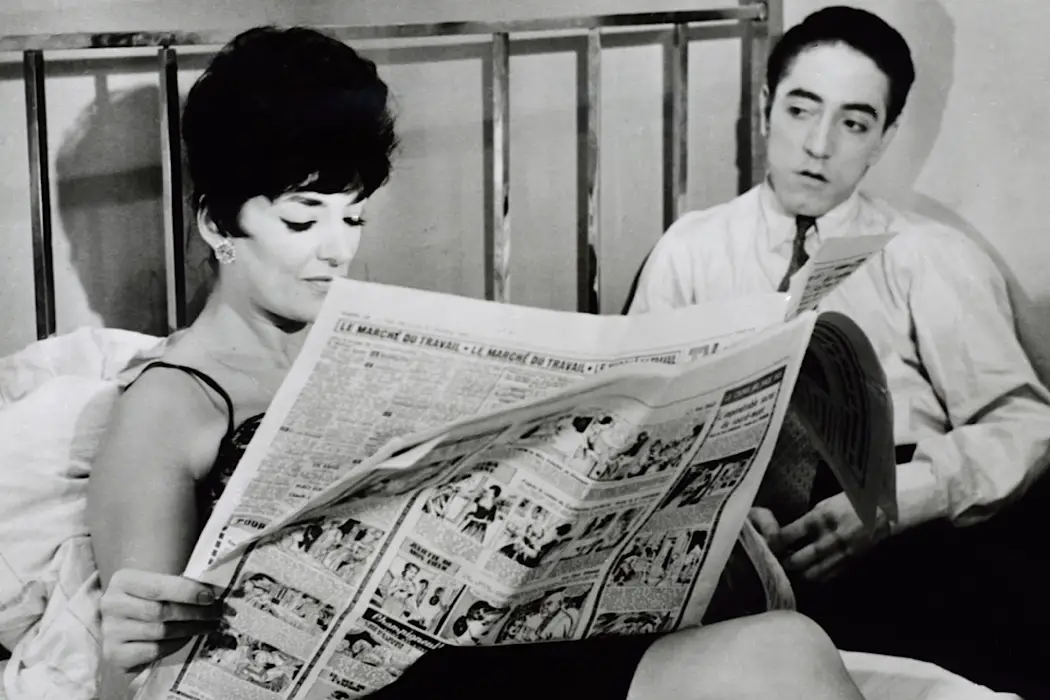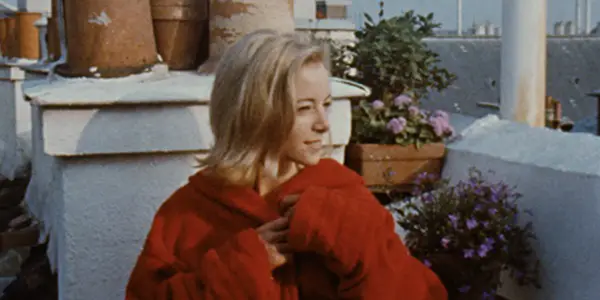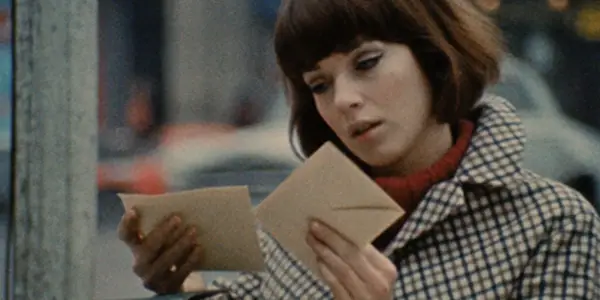SIX IN PARIS: A French Dispatch from 1965

Lee Jutton has directed short films starring a killer toaster,…
Forty years before a range of filmmakers (including but not limited to Gurinder Chadha, Gus Van Sant, Alfonso Cuarón, and Wes Craven) paid tribute to the various neighborhoods comprising the City of Lights in the anthology film Paris, je t’aime, producer Barbet Schroeder asked six of his compatriots in the French New Wave to do something similar. Giving each of them a 16mm camera and some color film stock, he asked them to go out and shoot a short showcasing a different part of Paris. The resulting film, Six in Paris—now available on Blu-ray in a new 2K restoration from Icarus Films—provides an intriguing time capsule of a city and a cinematic movement, even as it occasionally suffers from repetitiveness in tone and perspective.
Every Frenchman Has One
No anthology film is ever entirely consistent in quality; the same goes for Six in Paris, even with all of the iconic names involved. The six shorts comprising the film are all aesthetically pleasing; after all, how could they not be, when shooting on the glorious grain of 16mm film and showcasing one of the most beautiful cities in the world? (In addition to the stellar cinematography, the use of live sound and largely improvised takes gives all of the films a lively, realistic feel even when the stories are lacking.) But some shorts are naturally stronger than others, and several repeat themes that are somewhat misogynistic. This isn’t surprising when one considers that all of the filmmakers are men, and mostly from the Cahiers du Cinéma cohort; the alternate perspective of someone like Agnès Varda is sorely missed.

Jean Douchet’s “Saint-Germain-des-Prés” gets things off to a bright start with a comedic story about an American student seduced by a French man about town; a later, similar encounter with another, similar man opens her eyes to the types of shenanigans men will engage in to get a girl in their bed. It’s a fun little film reminiscent of the romantic battles waged on screen in so many legendary French New Wave features. It’s followed by Jean Rouch’s fully absorbing “Gare du Nord,” which is quite different in execution and tone but just as enjoyable. Packed with incisive dialogue and incredible camerawork—the film is shot handheld, in almost a single take—“Gare du Nord” begins at a breakfast table where a girl argues with her boyfriend (played by Schroeder) about how bored she is with their shared life; she then leaves and encounters a different man on the street, who demands she run away with him or he’ll kill himself.
So This is Paris
It’s from here that things start to waver in quality. Jean-Daniel Pollet’s “Rue Saint Denis” chronicles an evening between an older, world-weary prostitute and her younger, inexperienced customer in which she teases him incessantly, albeit with an almost maternal warmth; it isn’t without humorous moments, but I mostly found it exhausting, and too infatuated with the sex worker cliches that often plague the French New Wave. Fortunately, it is followed by Eric Rohmer’s “Place de l’Etoile,” an energetic comic thriller in which a man worries he accidentally killed someone during a chance encounter in the chaotic sea of pedestrian and vehicular traffic surrounding the Arc de Triomphe. It is worth noting that Rohmer and Douchet’s segments are both shot by the great cinematographer Néstor Almendros, who went on to shoot such classics as Rohmer’s My Night at Maud’s and Terrence Malick’s Days of Heaven, among many others; his unrivaled ability to work with natural lighting that made Days of Heaven, in particular, such a gorgeous film is on full display in Six in Paris.

Alas, the fifth segment, directed by arguably the biggest name—Jean-Luc Godard—is also the biggest dud. In “Montparnasse et Levallois,” Godard decides to depict the newspaper story that Jean-Paul Belmondo relays to Anna Karina on screen in A Woman is a Woman; the story is that of a woman who believes she has mistakenly mixed up the telegrams she sent to two lovers, and so sets out to rectify the error. Sounds amusing, right? Unfortunately, the resulting film, which stars Canadian actress Joanna Shimkus, is a hotbed of woman-hating anxiety; all of Godard’s anger and mistrust over being left by Karina, which manifests itself frequently throughout his work in various duplicitous depictions of women, is on full display here and erupts in physical violence and abusive language that I found altogether unenjoyable—and I am largely a Godard apologist! (I have to pay tribute to Shimkus’ on-screen style, though, as her big bangs, little red sweater, and belted skirt are the epitome of Sixties chic; at the same time, I couldn’t help but wonder if she had been styled specifically to look like Karina.)
Things end on a high note with Claude Chabrol’s pointed excavation of bourgeois mores, “La Muette.” The film—which, unlike the others, takes place almost entirely inside—stars Chabrol and his then-wife, Stéphane Audran, as a couple who can’t stop arguing; their young son seeks solace in a pair of earplugs that provide him (and by extension, the audience) with some much-needed peace amidst the unpleasantness. Like Godard, Chabrol uses his segment of Six in Paris to explore issues that would preoccupy him throughout his career, but unlike Godard, he does it in a really fresh and funny way.
Conclusion
Despite its flaws, Six in Paris should fascinate fans of the French New Wave—or, really, fans of anything French at all. And, if you’re still hungry for more once you’re finished watching, the Blu-ray from Icarus Films includes bonus interviews with Schroeder, Rouch, and Rohmer. The croissants and cigarettes you’ll have to supply yourself.
Six in Paris is now available on Blu-ray via Vinegar Syndrome.
Does content like this matter to you?
Become a Member and support film journalism. Unlock access to all of Film Inquiry`s great articles. Join a community of like-minded readers who are passionate about cinema - get access to our private members Network, give back to independent filmmakers, and more.
Lee Jutton has directed short films starring a killer toaster, a killer Christmas tree, and a not-killer leopard. Her writing has appeared in publications such as Film School Rejects, Bitch: A Feminist Response to Pop Culture, Bitch Flicks, TV Fanatic, and Just Press Play. When not watching, making, or writing about films, she can usually be found on Twitter obsessing over soccer, BTS, and her cat.












